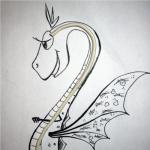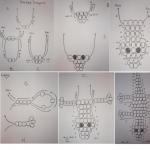Chin shaking in a newborn syndrome. Why does a newborn have a chin shaking
Only a newborn baby has a set of unconditioned reflexes that he acquired while in the mother's belly - sucking, swimming, grasping. The baby's nervous system is imperfect and not fully formed, which can result in trembling of the limbs and other parts of the body. Most of all, young parents can be frightened by the onset of tremor - when a newborn's chin shakes. You can find out if there is a real cause for excitement by understanding the causes of muscle tremors.
Interaction with external stimuli is stressful for a newborn baby. The immaturity of its nerve centers leads to the fact that the legs can begin to twitch, shake hands, and when crying - the chin, lower lip, jaw. Why does the baby's chin shake:

In response to physical or emotional overexcitation, the baby's central nervous system reacts with increased excitability, which leads to excessive physical activity and chin trembling.
Strengthening of the nervous system and normalization of the endocrine system in infants occurs at about 3 months of age. According to the famous pediatrician, to whose opinion many mothers listen, Evgeny Komarovsky - chin tremor in babies is observed in almost half of newborns and in most cases does not require treatment.
Parents should observe the development of the baby, identifying on their own why the baby's lower lip and chin are shaking. Do not worry if the tremor is observed during feeding, crying, sudden movements, loud sound, and in the relaxed state of the baby it completely disappears.

There are the following signs when it is worth contacting a neurologist:
- Not only the lower lip, chin, but also the eyelids, tongue, head are shaking.
- At rest, there is a tremor of the chin, head, lower jaw.
- The tremor persists and continues beyond the age of 1 year.
- Asymmetrical tremors of different parts of the body.
- Muscle cramps are accompanied by blue discoloration and perspiration.
All suspicious symptoms should alert parents and serve as a reason to see a doctor. Only a comprehensive examination will help determine the true causes of the tremor - why the newborn's lower lip and chin are shaking.
The pathological tremor, which is also observed at rest, affects the general condition of the child: sleep, appetite is disturbed, tantrums and long crying occur in infants. To relieve the condition and relax the muscles, it is recommended:
- Taking warm baths, if the baby is pleased. Calm actions of a mother during bathing have a beneficial effect on the general condition of her child.
- Light massage for the whole body. The massage procedure can be prescribed on the recommendation of a doctor, in which case it is better to perform a professional massage in a course. Light massaging strokes of the baby, which can be performed by the mother using baby oil, will have a beneficial effect on the muscles. If the baby began to cry during the session, then it is worth stopping the manipulations and revising the massage technique.
- Children's light body gymnastics. It will provide good blood flow to all body tissues and strengthen muscles.
- After a doctor's examination, in more difficult situations, drug treatment may be prescribed.

To carry out massage at home, you need to learn how to perform basic movements: stroking, vibration, rubbing and kneading. Recommendations for massage:
- Creation of the optimal temperature in the room, at which the baby will not be cold.
- It is necessary to start and end the massage with stroking.
- It is necessary to conduct a session when the baby is in a good mood - most often this is the evening before bathing.
- The session time should be about 5-10 minutes so that the baby does not get tired and cold.
How quickly the baby's nervous system will return to normal directly depends on the behavior of the parents.
Warm family atmosphere, affectionate attitude towards the baby, play and care will help to successfully overcome physiological tremors... In close alliance with the pediatrician, with careful implementation of his recommendations, the pathological tremor will also be overcome.
The birth of a child is not only a great joy and happiness for parents, but also a great responsibility and fear for his health. They are especially concerned about any deviations in the behavior of the baby of mothers and fathers of first-borns, since they experience all these feelings for the first time and often simply do not know what to do in certain situations and how to help a very young child. One of these alarming symptoms for parents is chin trembling in newborns. It is important to know what caused this condition and whether it is considered a deviation from the norm.
Content:
Causes of chin trembling in newborns
A child, even if he is full-term, is born with immature nervous, digestive, endocrine, immune systems, insufficiently developed organs of hearing and vision. It is quite logical that these features of the organism are reflected in the behavior of the newborn. He may experience, for example, chin trembling with emotional arousal, periodic jerking of arms and legs, regurgitation after feeding, which is not typical for older children.
Thus, the main reason for chin shaking in many newborns is the immaturity of the nerve centers responsible for coordinated coordination of movements. In addition, an additional effect is exerted by the increased secretion of the hormone norepinephrine, caused by the underdevelopment of the adrenal medulla, stress during childbirth and adaptation to new conditions.
Important: In premature babies, a shaking chin and jerking of arms and legs are observed more often and are more pronounced, since their nervous system is even more immature in comparison with full-term babies.
The reasons for the tremor of the chin and lower lip in a newborn baby can also be an unfavorable course of pregnancy or problems in childbirth. These include:
- intrauterine infections;
- nervous stress in a pregnant woman;
- prolonged or rapid labor;
- conditions leading to the development of hypoxia in the fetus (cord entanglement, placental abruption, chronic diseases of the mother, bleeding, and others).
Video: Children's neurologist about the peculiarities of the nervous system in children of the first year of life
Circumstances causing chin tremors in a newborn
Involuntary muscle twitching, or tremors, can be triggered by both positive and negative emotional experiences, to which the baby is not yet accustomed, does not cope with them. Normally, it lasts only a few seconds. Sometimes this condition is observed even during feeding.
Stressful situations for a newborn that can cause fear, excitement, crying and, as a result, chin trembling, include:
- painful sensations;
- dressing up;
- hunger;
- bathing;
- fatigue;
- unsuitable temperature conditions;
- exposure to bright light, strong odor, or loud sound.
When do you need to see a doctor?
For most newborn babies, chin tremors go away on their own after three months of age. Sometimes, due to the individual characteristics of the baby's development, this period can last up to 6 months (for premature babies). If a newborn's chin shakes only when emotionally aroused, in parallel with this, there are no other alarming symptoms, then this is considered normal and should not cause panic in the parents. But just in case, you should inform the supervising pediatrician about this.
Alarming signs are the conditions of the newborn when the tremor:
- observed in a baby not only when excited, but also at rest;
- persists after 6 months;
- extends to the muscles of the entire head;
- accompanied by blue skin and perspiration on it;
- lasts more than 30 seconds;
- expressed quite strongly.

If the listed symptoms are found in a newborn, you should immediately contact a specialist, as they may indicate disturbances in the functioning of the nervous system. The sooner the examination is carried out, the diagnosis is made and the appropriate treatment is started, the easier it will be to cope with the problem.
In addition, constant supervision by a neurologist during the first year of life of children who have been diagnosed with hypoxia at birth or during intrauterine development is mandatory.
Recommendation: A routine consultation with a neurologist is necessary for every child at the age of 1, 3, 6 and 12 months. During these periods, the doctor must assess the pace of development of the baby, his physical activity, emotional state, nervous excitability, reflexes and muscle tone, and the functioning of the sense organs.
How to help a child with a shaking chin
In the absence of pathologies on the part of the nervous system, chin trembling in newborns goes away over time by itself. However, parents can help the baby cope with the problem as soon as possible. To do this, it is recommended to give him a special relaxing massage, perform simple exercises, add chamomile decoction to the baths when bathing, observe the daily regimen. These procedures will promote the development, relaxation and strengthening of the nervous system.
It is better to entrust the massage and exercises to an experienced specialist so as not to accidentally harm the child with improperly selected techniques and exercises.

Of great importance for the calmness of the newborn is a favorable atmosphere in the house and constant contact with the mother, with whom he is still very emotionally connected. Therefore, she should be as calm as possible, confident in herself and her actions, give the baby warmth and care, more often take him in her arms and talk to him. Then the child will feel more secure. Also, a mother must learn to intuitively understand her newborn baby, carefully analyze which actions cause him stress, crying and chin tremors, try to avoid them or perform them differently, more comfortably.
Prophylaxis
The expectant mother needs to take care of the prevention of chin trembling in a newborn baby even during pregnancy. To do this, she needs:
- avoid nervous stress;
- rest more;
- Healthy food;
- often walk in the fresh air;
- follow the doctor's recommendations.
Many women during pregnancy and at the planning stage take a special vitamin complex that contributes to the normal development of the fetus. Only an obstetrician-gynecologist should prescribe such drugs, taking into account the state of health of the pregnant woman.
According to experts in the field of pediatrics, in the overwhelming majority of cases, the phenomenon of a chin shaking in a newborn baby is due to physiological reasons and does not pose any threat to life and health. Nevertheless, if the parents have any doubts about this, it is imperative to show the baby to the doctor in order to precisely exclude the presence of pathologies from the nervous or endocrine systems.

The famous pediatrician Yevgeny Olegovich Komarovsky notes that some newborns may experience trembling of the chin, arms and legs during undressing or emotional arousal. If such a tremor is not accompanied by any other clinical manifestations and is isolated, then you should not worry. This is just one of the signs of an imperfect nervous system in a newborn, which should normally disappear by 3-4 months.
The vigilance and anxiety of many mothers sometimes goes off scale. When young parents notice that their chin is shaking for some reason, tremors of the arms and legs appear, they are seized with panic. Is there any real cause for concern?
Each person, under certain circumstances, noticed that his limbs were shaking. Most often this comes from intense excitement. As a result of hypothermia, tremors of the arms and legs occur, the lower jaw trembles, and when crying - the chin, lower lip.
Why do babies often have shaking legs, shaking hands? Muscle twitching is the result of excessive stress, overexertion of the nervous system.
Trembling of the arms and legs, head, lower jaw, lips, which begins as a result of external influences (cold) or when crying, is not a pathological condition if it disappears when the external stimulus is eliminated.
Tremor in a newborn baby
As a rule, up to three months of age, the baby's nervous system is imperfect, as a result of which one can observe how his leg twitches, his arms shake, and when crying, the chin, lower lip, and jaw often tremble. It should be noted right away that if these symptoms quickly disappear after the baby has calmed down, then there is no reason to worry.
A tremor of the head may indicate certain neurological disorders that require appropriate treatment by a neurologist or neuropathologist.

Causes of tremors in infants:
- Physiological immaturity of the baby's nervous system.
- Premature pregnancy.
- Complications during childbirth, such as rapid labor or protracted labor.
- Complications during pregnancy: uterine hypertonicity, fetal hypoxia, etc.
- The stress that a mother experiences while carrying a child, her experiences, fears. All this can affect the vulnerable nervous system of the baby.
Typically, treatment is not required if:
- Tremor of the arms, legs, chin is observed in a baby until he reaches three months of age.
- The chin trembles when the baby cries.
When to sound the alarm
The baby's parents should be alerted if:
- The child's hands and chin are shaking, but also convulsive tremors of the whole body are observed.
- Head tremor.
- The baby's arms and legs tremble for no apparent reason.
- The general condition of the baby is alarming: he is lethargic, whiny, and does not sleep well.
- As the child grows up, the tremor of the arms and legs does not go away, it becomes more pronounced.

Having noticed these symptoms, you should rush to the doctor, who, having examined the baby, will be able to explain why the tremor is present.
No need to worry
Children grow by leaps and bounds. Every day, changes are noticeable in their development. The baby simply "outgrows" many of the symptoms. The nervous system matures, and, accordingly, tremors, regurgitation and other troubles are left behind.
- A baby has a shaking chin before the age of three months.
- The baby quickly calms down, and the trembling immediately disappears.
- Against the background of trembling of the hands, legs, chin, there is no violation of the general condition of the crumbs.
- There are no other neurological symptoms.
- Chin, lower lip trembling while crying.
What to do
As a rule, tremor treatment in children under 3 months of age is not required, but it is necessary:
- Monitor the baby's condition.
- Analyze what factors are the reason that the child's arms, chin, lower lip, jaw are shaking.
- Determine the presence or absence of other complications in the state of health of the baby, for example, sleep disturbances, tearfulness, mild excitability, tremors of the limbs and body for no apparent reason, etc.

- Inform the attending pediatrician or family nurse that the baby's arms or legs are trembling, and require that the baby be examined by the appropriate specialists.
- To create an atmosphere of calmness and goodwill in the house, since the psychological microclimate in the family significantly affects the health of children.
- Massages, warm baths will also be useful, provided that the baby perceives them with pleasure.
Tremors in infants are treated by a neurologist. Only an experienced specialist can prescribe the necessary drugs, control and, if necessary, adjust the treatment of the crumbs.
But still
When it comes to the development of a baby, it is always better to play it safe once again, because lost time can significantly complicate the treatment of a possible ailment.
If a lip or chin that trembles with crying does not cause serious concern, then the tremor of the legs and arms, which does not go away as the child grows up, should at least alert the parents and serve as a reason to consult a specialist. Appropriate treatment will be prescribed if necessary.
Tremors in newborns are a kind of muscle twitching that can be seen in babies from birth. It is found in almost all young children: there are practically no parents who would not notice the chin tremor in newborns, tremors of the legs or arms. It manifests itself most often at moments of tension of the baby - when he cries or worries due to hunger or painful sensations (for example, at).
Causes of tremors in children
Immaturity of the nervous system.
In the first weeks of a child's life, his movements are completely uncoordinated, the nervous system is still immature, which causes trembling of the limbs. If the baby also has an increased muscle tone, then the likelihood of tremor increases significantly. Most often, this tremor occurs due to the fact that babies have immature nerve centers that are responsible for movement in the brain, and also due to an excess of norepinephrine in the blood of the newborn during the manifestation of emotions. This excess appears due to the immaturity of the adrenal medulla.
Fetal hypoxia.
While waiting for a baby or during childbirth, disturbances in the placental blood flow may occur, which also contributes to disturbances that are associated with the activity of the brain. Hypoxia itself occurs with violations of the functionality of the placenta, and with various bleeding, and with the threat of miscarriage, and with polyhydramnios, and with intrauterine infections. Sometimes during childbirth there is a weakness in labor, and sometimes there is a rapid birth, sometimes there is an umbilical cord entanglement, or - all these options can lead to problems with the baby's nervous system. As a result, there is a violation of the movement of oxygen to the brain, which is fraught with the development of tremors in newborns.
Premature baby.
Very often, it is premature babies who suffer from tremors of the legs, chin or lips, since their peripheral and central nervous systems were initially immature. And although their maturation continues outside the mother's body, despite full and proper care, this still cannot replace all the conditions for being in the womb.
When should tremor be treated?
As a rule, treatment is not required, because tremors in children go away by the age of three months on their own.
If the tremor captures not only the arms or chin, but also the legs, the head at the same time, then this is an alarming symptom. Moreover, if the twitching is completely unrelated to arousal or hunger. It is dangerous if the tremor does not subside for weeks or months. This condition of the baby can be associated with serious problems:
- hypoxic-ischemic encephalopathy,
- hyperglycemia,
- drug withdrawal syndrome,
- hypocalcemia,
- hypomagnesemia,
- sepsis,
- intracranial hemorrhage,
In the event that the tremor occurs during crying, fright, or REM sleep, there is no need to worry, but if the tremor is unreasonable and intensifies, there is a clear neurological disorder. In this case, you must immediately contact a specialist. Basically, in addition to observation by a neurologist, children are recommended a course of massage and therapeutic exercises - this should be carried out by a highly qualified specialist. It helps to cope well with tremors of swimming - this can be done even in the bathroom. Such children must be in a calm environment - friendly and even. This will be a kind of treatment for the baby.
When the exciting time of pregnancy and frightening childbirth are left behind, young mothers feel that they are already on the shoulder. But it was not there! A small toddler requires a lot of care, attention, care, and all these aspects are fraught with various secrets and all the same fears. Much can easily lead you into a stupor or make you get really worried. Here is the baby babbling happily, waving his arms in the air ... but after a second he stops talking, and his chin begins to shake finely? Is this normal or a serious illness? What is the reason for this in the first place? Let's figure it out together!
First, let's find out what this phenomenon is called. Yes, yes, it has a name - infant tremor. It is characterized by the fact that the chin, lower lip, head, or even legs with arms are shaking in the newborn. But wait, sound the alarm, such manifestations are considered, albeit not quite typical, but within the framework of the norm.
Reasons why a newborn's chin shakes
In fact, there are several factors that can provoke a tremor in a baby. And first of all - this is premature birth and, as a result, prematurity of the fetus. Various complications during pregnancy can also become the cause. These include:

Even if the child was simply born too quickly or, on the contrary, the birth was long, this can already cause a temporary manifestation of developmental features in the form of tremors. But why does the baby's chin shake even when all of the above dangers and reasons for concern were not there?
Causes of the physiological chin tremor in newborns
It's simple. The main reason for this temporary "disorder" lies in immaturity or insufficient development of the baby's nervous system, and in some cases, the adrenal glands are to blame, producing the so-called stress hormone in excess. The fact is that the organs of the fetus during pregnancy can develop in parallel to each other and at a time when some of them are well developed, others complete their formation after birth. Not to mention that any environmental impact is an irritant and can cause real stress in a baby:

Muscle hypertonicity, which often accompanies newborns in the first months of life, is also often correlated with signs of tremor: trembling of the arms, legs, lips, and including the chin. As well as excessive physical stress or severe fright.
If the set of all these reasons is subdivided into groups, then in general chin tremors are caused by two factors:
- Neurological- children are born with a lack of coordination of movements, so at first it is difficult for them to control their movements and emotions.
- Hormone- any strong emotion of the baby causes a violent reaction of the nervous system due to the excess of norepinephrine produced by the adrenal glands.
In what cases is a chin tremor in a baby considered normal?
If the baby's lower jaw does not tremble all day long, but begins to shake only in certain cases, then there is a high probability that you shouldn't be afraid of this phenomenon at all... It is normal for a newborn to react violently by crying when a door slamming or a dog barking, even if the handle or chin twitches convulsively during a child's "tantrum". The baby's nerve centers are still forming and are just learning to react to the world correctly, therefore, in their first days and up to three months of life, the tremor is caused not by any deviations, but by the most common features of the growth of the baby.
 There is no need to worry too much if the tremor manifests itself in any other situations, one way or another, causing discomfort to the child. How many people take the shakes in their hands before a thrilling public performance or after being chased by a boss? There are a great many such, as well as other examples. By such "twitching" the nervous system implements the reflex developed by nature itself, the instincts of fear and self-preservation.
There is no need to worry too much if the tremor manifests itself in any other situations, one way or another, causing discomfort to the child. How many people take the shakes in their hands before a thrilling public performance or after being chased by a boss? There are a great many such, as well as other examples. By such "twitching" the nervous system implements the reflex developed by nature itself, the instincts of fear and self-preservation.
Unless in the case of a baby, the role is mainly played by adrenal glands and norepinephrine... The nervous system of babies is far from being so strong and experienced, and in premature babies it often continues to form. And there is nothing surprising in the fact that she is agitated and frightened by unknown things - the nerve centers of a newborn are simply not able to immediately figure out and respond to the influence of the external environment. Therefore, excessive excitement arises - in response to stress.
And what is stress for a newly born child? Anything, because the world is so unlike a cozy mother's womb! From hunger and bright lights to talking people and breastfeeding. Even the last, seemingly self-evident feeding for a little baby is a real test.
When should a newborn's tremor be a concern?
As we have already found out, tremors and chaotic twitching of the limbs or chin in the first months of life are most often normal physiological phenomenon... And over time, they must independently pass by the age of three months, in rare cases - by six. But nevertheless, you should not ignore the consultation with a pediatrician.
A professional examination will not only reassure the parents once again, but will also "present" them with some useful tips on how to improve the comfort of the baby and help cope with poorly controlled nerves. And even more so, one should not neglect qualified assistance during critical periods of a baby's growth, when his nervous system is considered especially vulnerable. Scientists relate them to months of life, multiples of three:
- 3 months;
- 6 months;
- 9 months;
- 1 year.
At this time, a pediatrician is not even so much desirable as required. But such visits to the doctor are more likely a routine check. And in what case is there a real reason to seek help, and not to an ordinary children's doctor, but directly to a neurologist?

1-2 of the above reasons are already enough to make an appointment with a pediatric neurologist as soon as possible. And no self-medication! This is the case when only a doctor can make a correct and correct diagnosis. In addition, a competent examination will unambiguously determine whether the baby needs tremor treatment or whether it is an atypical feature of the development of his nervous system.
How can you help your baby cope with physiological tremors?
If it happens that the child still needs treatment, then in no case should the recommendations of the neurologist be neglected. But even if not, there are ways to make life and development easier for the baby. After all, one way or another, chin trembling - evidence of overstrain of nerve centers... And, in addition to complying with medical prescriptions, it is important to create comfortable conditions for the newborn that could help correct his development in the right direction.
 Of course, it is impossible to get rid of absolutely all irritants, but try to find among them those that are especially "disturbing" for the baby and which can be eliminated. For example, it costs nothing to replace a bright lamp with a dimmer one. Or maybe the child is uncomfortable with the view of the roadway from the window? Most likely, it will take more than one day to learn how to understand his signals.
Of course, it is impossible to get rid of absolutely all irritants, but try to find among them those that are especially "disturbing" for the baby and which can be eliminated. For example, it costs nothing to replace a bright lamp with a dimmer one. Or maybe the child is uncomfortable with the view of the roadway from the window? Most likely, it will take more than one day to learn how to understand his signals.
But at the same time, there are things and actions from which the child cannot be protected. If the tremor is caused by feeding, changing clothes, bathing, or the like, then you should resort to any tricks designed to make the event more enjoyable. Many doctors recommend young mothers to resort to to the preliminary massage of the baby... It relaxes not only muscles, but also nerves. Be sure to ask your pediatrician to show you a couple of "tricks" from the soothing arsenal.
If massage for some reason does not work, then you can resort to another way to cope with the baby's nerves - herbal baths with valerian, St. John's wort, mint, oregano and some other herbs that have a relaxing effect. Compliance with the same sleep and nutritional regimen will also help accelerate the adaptation of the child. Drug treatment is permissible, but only with the permission of a pediatric neuropathologist and in difficult or advanced cases.
Well, and most importantly - do not despair and do not give up! If you do not leave a newborn alone with a tremor, then it will not be difficult to cope with it. At a young age, the nervous system is quite flexible and easily amenable to correction.





